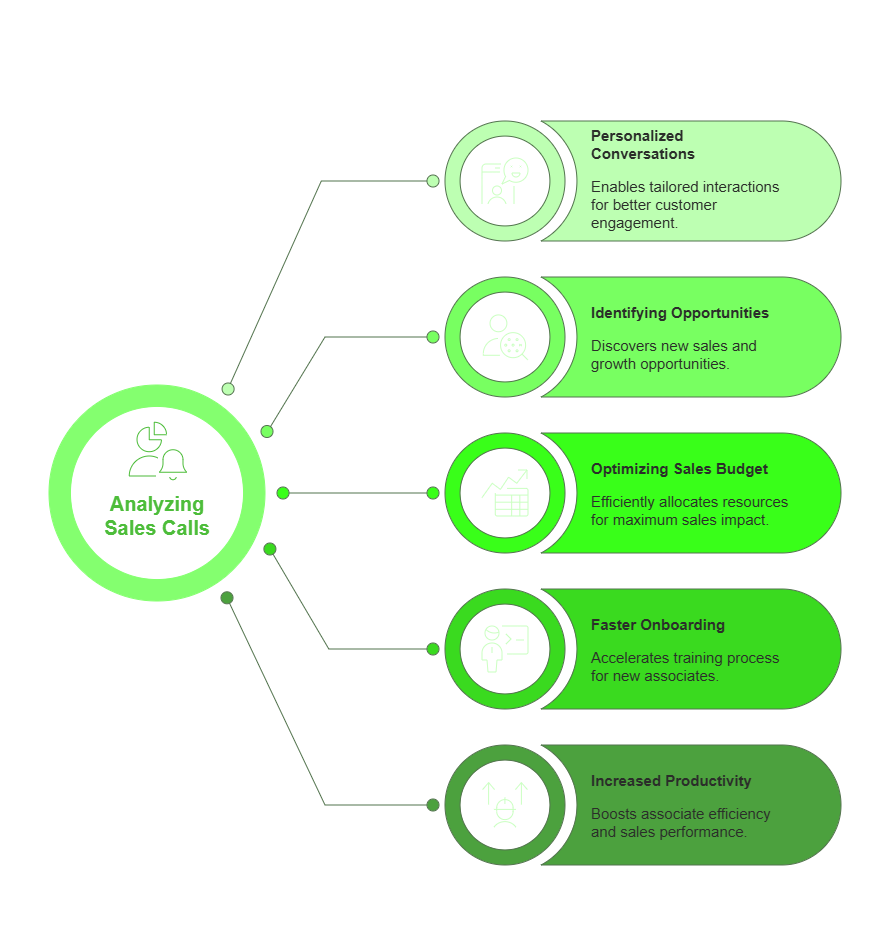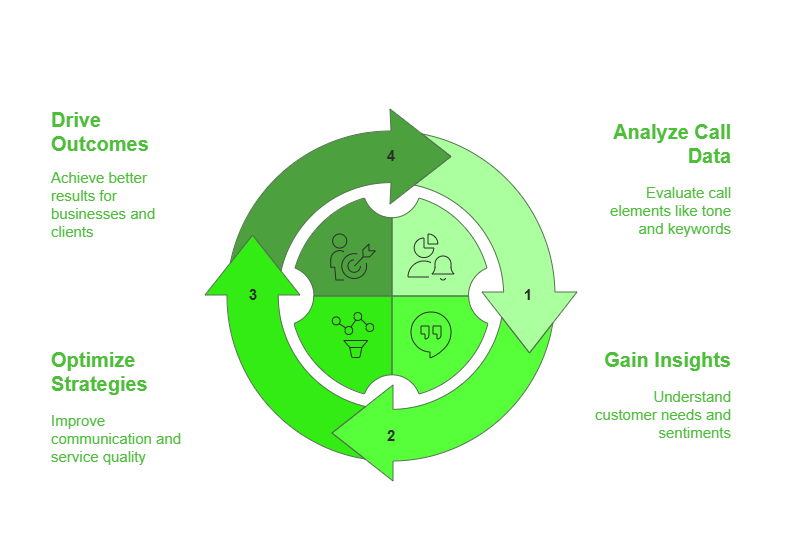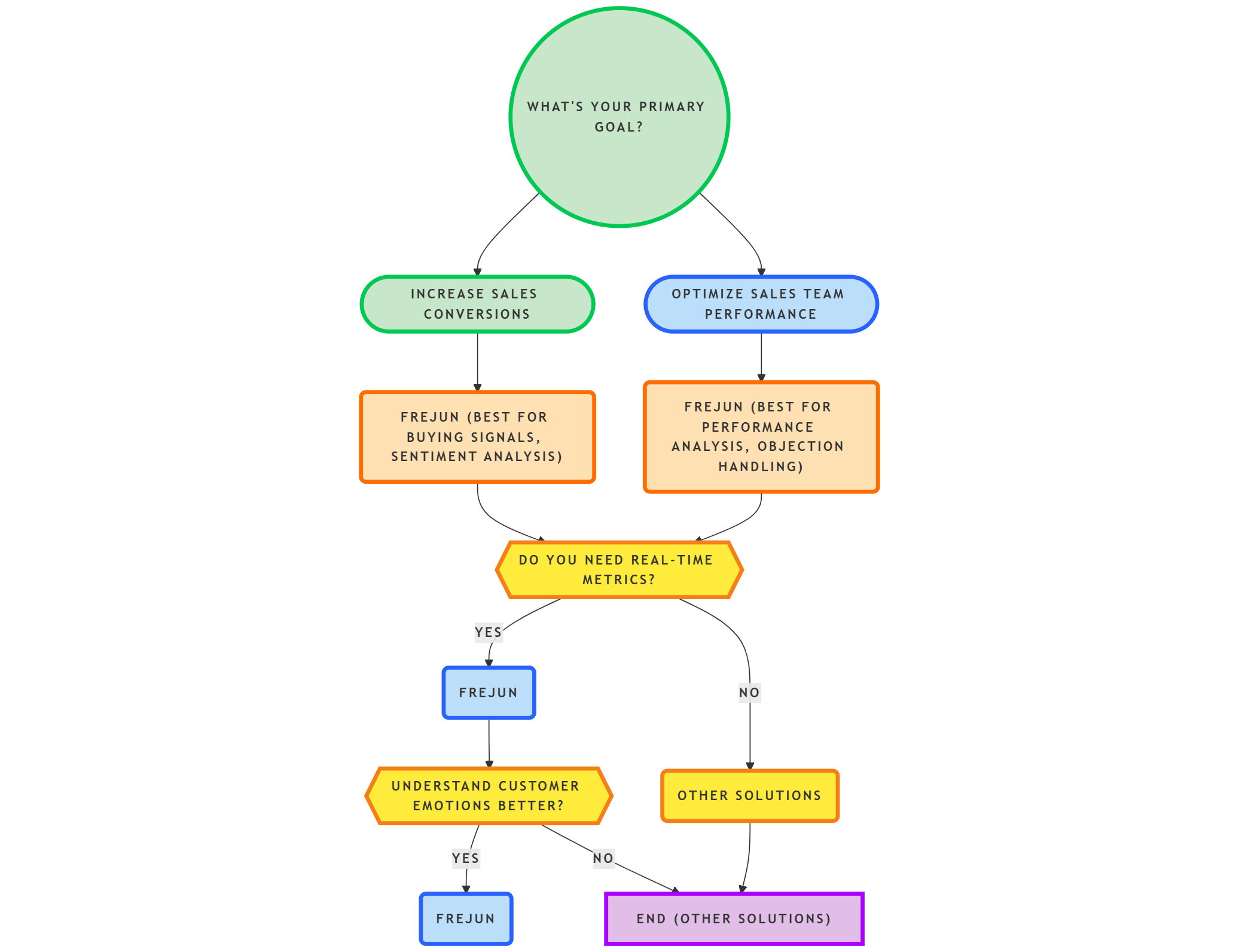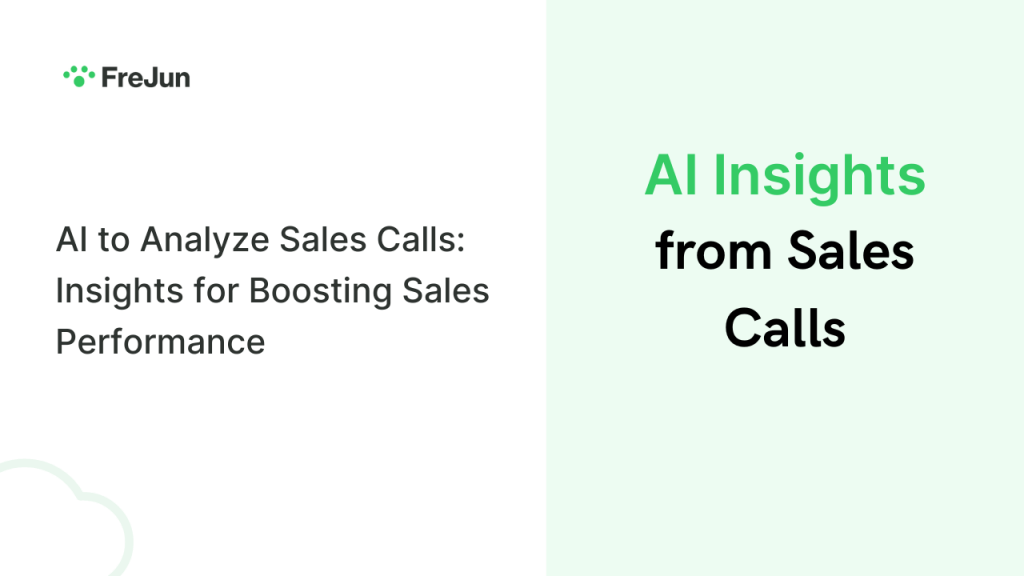Last updated on June 9th, 2025 at 11:24 am
In 2025, outbound sales teams are becoming increasingly reliant on customizable auto-dial software to improve productivity and efficiency. Auto-dialers eliminate the need for manual dialing, allowing sales reps to focus more on conversation and closing deals. Sales Call Analysis are always on the lookout for ways to close more deals. A decade ago, they relied on intuition and guesswork to find various approaches that would help them convert a prospect into a paying customer. But today, things have changed considerably. Rapid technological advancement is helping sales associates make better decisions backed by solid data. One such technology, Artificial Intelligence(AI), is helping Sales Call Analysis by providing valuable data about their communication skills, the effectiveness of the sales strategies employed, and overall customer satisfaction after every call. In this post, we will focus on how AI is used to analyse sales calls and boost overall sales performance in an organisation. But first, let us understand why it is important to analyse your sales calls.
How Can AI-Driven Sales Call Analysis Help Teams Improve Performance And Gain Actionable Insights?
1. Track Key Performance Metrics: AI Monitors Talk Time, Listen Ratio, And Engagement Levels To Evaluate Effectiveness.
2. Identify Top Performers: AI Highlights Patterns In Successful Calls, Helping Replicate Best Practices Across The Team.
3. Detect Customer Sentiment: Tools Like FreJun Use Sentiment Analysis To Understand Buyer Emotions And Reactions.
4. Improve Training And Coaching: AI Pinpoints Areas Where Sales Reps Need Support, Enabling Targeted Coaching.
5. Ensure Script Adherence: AI Verifies If Sales Representatives Are Following Approved Scripts Consistently.
6. Spot Lost Opportunities: Missed Cues Or Poorly Handled Objections Are Flagged For Follow-Up Or Review.
7. Enhance Personalization: Call Data Helps Reps Tailor Pitches To Match Customer Needs And Preferences.
8. Monitor Trends Over Time: Analyze Conversations At Scale To Identify Shifting Customer Behavior And Market Demands.
9. Automate Note-Taking And Logging: Platforms Like FreJun Auto-Capture Key Points From Calls, Reducing Manual Work.
10. Boost Close Rates: Leveraging Data-Backed Insights Leads To More Effective Sales Conversations And Higher Conversions.
Benefits of Analysing Sales Calls in Your Business

Here are some key reasons why you must constantly analyse your associates calls with leads, prospects, and customers-
1) Your Associates Will Have Personalised Conversations
While analysing your sales calls, you identify patterns in your prospects’ conversations. You will learn what your customers want from your business, what they want to hear from your associates, etc. In other words, you will understand customer behaviour, emotions, objections, etc. It will help your associates to tailor their conversations to achieve better conversion rates.
2) You Will Be Able to Identify Opportunities
As we have highlighted, you will access useful customer information by analysing sales calls. It will help in identifying different areas of opportunity. For instance, by analysing a call with one of your prospects, you find out they are unwilling to purchase your solution because it doesn’t have a key feature. This information will encourage you to build that new feature, which will attract a wider audience in the future.
3) It Will Optimise Your Sales Budget
In the past, sales leaders spent money on all the strategies they thought would work. It was purely based on intuition. Often, the strategies would fail, and they would lose the spent money forever. By analysing the sales calls, the same leaders today know which strategy is right for their business much before they allocate a good chunk of the budget. It will help optimise their sales budget and ensure the money is not spent on the wrong areas.
4) Your Associates Will Be Onboarded Faster
Onboarding new associates is one of the biggest challenges sales managers face today. It always takes considerable time and resources to onboard them and get them to start performing. In traditional training, associates must memorise endless call details, customer details, and different strategies, which can delay the training outcomes. But the insights offered by call analysis provide a more supportive training experience. It ensures that the associates have all the necessary information at any time without memorising them.
5) Your Associates Will Be More Productive
As a sales leader or sales manager, you can’t keep track of all the customer conversations and offer help to the associates whenever needed. But you can always share the data collected from past call analyses with the associates. They can learn from their peers and change their talk tracks if required. Their productivity will drastically improve without you having to help them all the time.
AI-Powered Call Analysis Benefits
| Feature | Sales Impact |
| Sentiment Analysis | Identifies emotional tone in conversations |
| Keyword Detection | Highlights crucial sales trigger words |
| Real-Time Alerts | Helps managers intervene when needed |
| Talk-to-Listen Ratio | Balances rep-customer interaction |
| Call Summary Reports | Saves time with automated insights |
What is AI-based Call Analysis?

AI-based call analysis is a method of automatically analysing calls and deriving useful insights from them. An AI-based call analysis tool can find trends in conversation, including speech patterns, keywords, and sentiments. It can evaluate sales associates performance and identify leads’ preferences.
The analysis is useful for all the stakeholders involved. The associates can use the generated data to improve call outcomes. On the other hand, sales managers can use the data to optimise their coaching plan, boost associates’ productivity, and build a predictable pipeline.
AI-based call analysis uses a blend of machine learning algorithms and NLP (Natural Language Processing) techniques to analyse and interpret the content of your sales calls thoroughly. The typical steps involved in AI-based call analysis are:
Step 1: Collect the recordings of your associates’ phone conversations with the prospects.
Step 2: Convert the audio recordings into a text format. The core piece of technology used here is speech-to-text.
Step 3: Extract all the relevant data from the text. It accurately completes this step using sentiment analysis, topic extraction, and speaker identification.
Step 4: Use a combination of supervised and unsupervised ML algorithms to train the model before analysing the data.
Step 5: Analyze the results and present the insights meaningfully, mostly in dashboards and associates.
Using AI to Analyze Sales Calls

Why Use AI to Analyse Sales Calls?
Your sales associates must be agile and efficient to stay ahead of the competition. The easiest way to achieve this is by leveraging the power of artificial intelligence to analyse sales calls. With minimal human intervention, it will help you gain valuable insights in minutes. Let us dive deep and understand the role of artificial intelligence in analysing sales calls –
1. Offers Better Accuracy
AI-based tools can identify patterns in your sales calls with high levels of accuracy. It can capture keywords, the tone of the conversation, and several other factors without any errors – this will greatly impact the call outcome. It will also capture all the key metrics of your sales call unbiasedly. Such accurate and fair data will help your team improve their sales skills quickly.
2. Saves a Lot of Time
Analysing sales calls takes work. It is quite time-consuming, particularly for companies handling lots of calls. AI-based tools are fully automated and can analyse calls with minimal human intervention. It allows your sales teams to focus on more mission-critical tasks. And the best part – it analyses these calls and churns high-quality in real-time.
3. Produces Better Insights
It doesn’t matter how much expertise your team has; there is a limit to their capabilities and the depth of analysis they can perform on sales calls. However, AI engines are extremely powerful. They can dive deep into sales calls and capture data that are not apparent to most humans. It can even identify minute areas for improvement that human analysts would have otherwise missed.
4. The Results are Consistent
This is another major benefit of automation and technologies like AI. They can continuously generate insights without getting influenced by factors like fatigue, bias, or emotion. It will ensure that all calls are analysed uniformly, offering a more accurate and fair assessment of your associates’ performances.
5. It Makes the Entire Analysis Process Quite Cost-Effective
Using AI to analyse your sales calls can be extremely affordable. For starters, it eliminates the need for multiple human analysts or consultants to analyse your sales calls. You can save on their salaries. Secondly, it offers the benefit of economies of scale. No matter how fast or big you grow, you do not have to spend exponentially to analyse your sales calls. It is particularly beneficial for startups and those businesses with limited resources.
10 Key Sales Call Insights Captured By AI
By analysing huge volumes of call data, AI tools can generate key insights that help in evaluating your sales process and help in making data-driven decisions. On that note, let us now go through some of the key call insights generated by an AI-powered sales call analysis tool –
1) Competitor Mentions
Some AI tools track competitor mentions in sales calls, which is vital information. They give your associates a great opportunity to establish trust in your business and create FOMO in the prospect’s mind. For instance, when your prospect mentions your competitor, your associate can show how your product or service is better than theirs and how many customers from your competitor have shifted to your business. Your associates need to highlight your product’s value while inspiring some competitiveness. When your associates access such information, they can tweak their solution plan and pricing structure. Lastly, they will be better associated to handle competitor-related objections during future sales calls.
2) Objections
Objections should never intimidate your associate. It is a positive sign for your business. By throwing an objection at your associate, your prospects want to know more about your product. They have given your associates a wonderful opportunity to prove your product’s worth. An AI-based analysis tool captures these objections in every sales call, enabling you to create scripts to tackle them and close the deal.
3) Questions Asked During the Call
Another key insight that can be gleaned from sales calls is the questions the prospects ask. These questions can offer rich information about the customer’s needs, pain points, and preferences, which can be used to tailor the conversation strategy. For instance, if most prospects ask about a key point in your pricing page, your associates can emphasise it in future calls. Similarly, these questions can also discover areas where your associates need additional training. For instance, if most associates struggle to answer a question on a particular feature the prospects ask, they can be given better training about that aspect of the product.
4) Call Summarisation
This insight is about extracting key information from the call and converting it into a short summary. The summary could include the main topics covered, any key points made by the prospect or the associate, and any discussed action items. By summarising the call, the tool can offer a high-level overview of the call that you can use to make prompt decisions. This is much better than reviewing the entire call recording or reading the whole transcript.
5) Keyword Mentions
This majorly involves identifying and tracking certain keywords or phrases your prospect mentioned during the sales calls. Many AI tools capture keyword mentions to indicate the interest and needs of the buyer. For example, if a prospect mentions the keyword “budget” multiple times, it means they could be highly price-conscious. It will enable you to alter your sales strategy and offer an appropriate discount to close the deal.
6) Conversational KPIs
Some sales call analysis tools can also capture key performance indicators like talk-to-listen ratio, talking speed, switches between participants, monologue duration, etc. Tracking these KPIs will help you formulate dos and don’ts for customer engagements. For instance, a high talk-listen ratio indicates that the sales associate is talking most of the time. It is not something you want. Your associates need the leads to open up and share their pain points. Only then can the associates pitch your product as an effective solution to their challenges. In short, to improve the talk-listen ratio, your associates must ensure that the prospect always leads the call, not vice versa.
7) Capturing Buyer Interactions
This insight revolves around capturing the entire conversations of the prospect with an associate and converting the spoken words into written text. It can then be analyzed further using NLP algorithms. Capturing buyer interactions allows you to review and analyze the details of a sales call in a more granular way. Also, you can easily go back and review key details, which means there is less risk of missing important details due to human error or memory lapses.
8) Follow-Up Tasks Discussed During the Call
During a sales call, the associate and the prospect might discuss multiple things that can lead to several tasks that need to be completed once the call ends. It could include sending additional information about a particular feature, scheduling a follow-up meeting, or drafting a proposal. A sales call analysis tool can automatically identify and track these follow-up tasks so that your associates do not have to worry about them. It will ensure that all the necessary tasks are completed on time and nothing falls through the cracks.
9) Topic Segmentation
Segmentation differs from call summarisation which simply converts the entire conversation into one concise content block. Topic segmentation divides the conversation into unique segments under which different topics are discussed. The goal of topic segmentation is to enable sales leaders to easily navigate to specific call sections and focus only on that aspect. For instance, if you want to know everything discussed on the pricing aspect, you can navigate to the pricing section and go through only that.
10) Sentiment Analysis
This insight mainly focuses on improving future sales conversations by identifying positive, negative, and neutral moments within past conversations. The tool uses NLP to analyse the language and tone used by both the associate and the prospect, which will help you understand the emotional state of the prospects. It will give you a deeper understanding of their desires. For instance, if the sentiment analysis highlights that most of the customers are getting frustrated talking to a particular associate, you need to train the associate better.
Role of AI-Based Sales Call Analysis in Personalised Coaching
The AI insights covered in the previous section can be extremely valuable for training your sales associate in a hyper-personalized manner. Here are some ways in which you can achieve that:
- Identifies Knowledge Gaps: AI-based sales call analysis can highlight where each of your associates is lagging in terms of skills or expertise. For example, if a particular associate cannot handle objections effectively, you can alter your training strategy to focus on effective objection handling.
- Improves Communication Skills: By measuring the conversational KPIs of individual associates, you can find out which associates need a boost in their communication skills. You can tailor the training program to teach them how to engage customers better and get prospects to open up using probing questions.
- Personalised Feedback: If you have a large team, providing individual feedback to some associates might only be possible. But AI-based sales call analysis platforms can help you counter this. It analyses the performance of each associate and offers instant feedback without any human intervention. For instance, if the associate consistently struggles to close deals, the tool can flag this and offer targeted training to improve their closing skills.
- Analysing Best Practices: AI-based sales call analysis can also identify the best practices followed by top-performing associates and use them to develop training programs for other sales associates. It will ensure that every associate is at par with industry standards, if not above.
Tips for Using AI to Analyse Sales Calls and Boost Sales Performance
- Choose the Right Tool: Since the market is inundated with hundreds of AI-powered sales analysis tools, you must select one that precisely meets your organisation’s requirements and goals. While picking the tool, you must consider its features, compatibility, and whether it fits your budget.
- Define the Metrics: Using a sales analysis tool without finalising the metrics is like shooting in the dark. You need to know whether your investment is right or not. So always decide on the KPIs you want to track and analyse. Pick one or more metrics from the list shared in the previous section.
- Train the AI Model: An AI tool is only as good as the data it gets. So to ensure that the tool accurately analyses sales calls, you must continuously feed it with the dataset of your concluded calls. The more data you provide, the more accurately the tool can predict the outcome.
- Monitor Continuously: Keep reviewing the tool’s output to ensure that it is providing accurate insights. If the results aren’t satisfactory at any point in time, you need to adjust the AI model or the metrics you are measuring.
- Use the Insights: Once the tool has analysed the sales calls and offered you insights, use them to improve sales performance. For example, if the insights revolve around the key areas where sales associates need additional training, use the data to modify your coaching strategy in all those areas without fail.
Conclusion
AI in sales call analysis can help teams improve performance and drive business growth. As AI continues to evolve, it will have a bigger role in sales and marketing in the coming days. It will create new business opportunities by utilising call data and achieving their sales goals. Also, it will improve the overall efficiency and effectiveness of sales calls in the coming days and increase customer satisfaction and loyalty.
In 2025, AI is transforming the way sales teams interact with prospects and analyze their calls. By leveraging AI-powered tools like Frejun, sales teams can gain deep insights into customer sentiment, detect buying signals, optimize call scheduling, and monitor rep performance. These AI-driven insights not only help boost sales performance but also enhance team efficiency, streamline processes, and increase conversion rates. FreJun stands out as the best solution for companies looking to make data-driven decisions and elevate their sales game. Embrace AI today and take your sales team’s performance to the next level.
Further Reading: Call Intelligence: What It Is, Features And Benefits
Frequently Asked Questions
It Is The Use Of Artificial Intelligence To Analyze Sales Conversations, Extract Insights, And Improve Team Performance.
AI is revolutionizing call analysis by delivering real-time insights during conversations, detecting sentiment to understand customer emotions, generating automatic call summaries, and scoring performance to help teams improve.
Yes. AI-Powered Tools Like FreJun Identify Effective Techniques And Help Reps Refine Their Pitch For Better Results.
Absolutely. FreJun Offers Scalable AI Features That Benefit Both Small Teams And Large Enterprises Alike.
Yes. FreJun Seamlessly Syncs AI Insights With CRMs, Helping Sales Teams Take Timely And Informed Actions.
Not At All. FreJun Offers A User-Friendly Interface Designed For Sales Teams, No Technical Expertise Required.
It’s Best To Review Weekly Using Dashboards Provided By Tools Like FreJun To Stay Ahead Of Trends And Performance Gaps.
A writer/business analyst, who enjoys expressing creativity through painting during leisure hours. Embracing the 'Workcation' philosophy, he seamlessly blends the craft of writing with the allure of exploring new destinations.
